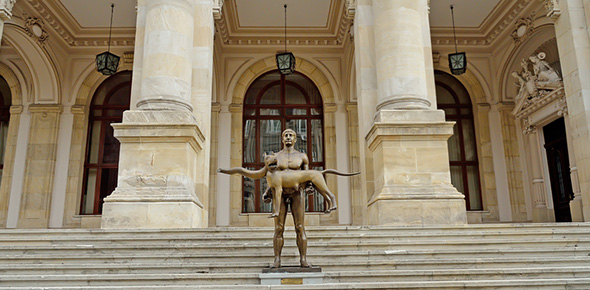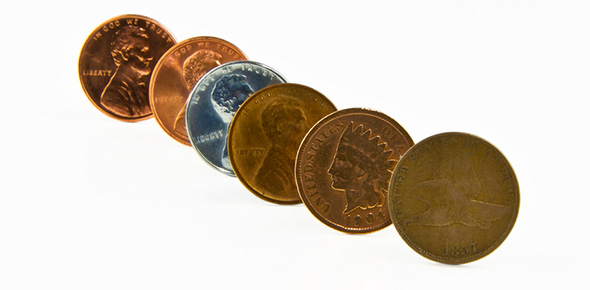Related Flashcards
Related Topics
Cards In This Set
| Front | Back |
|
What was the Federalist plan for organizing the national government and its finances? What role was played by Alexander Hamilton?
|
The Federalist plan was proposed by alexander hamilton.
he urged congress to assume the state debts and to combine them with the federal government's foreign and domestic debts into a consolidated national debt.
A permanent debt would attract the wealthiest financiers.
It would bring economic power to the government.
national debt was his focus point for the plan.
The bank of the us would print and back the national currency and would regulate other banks, thus giving the bank a powerful interest in the fiscal stability of the government.
|
|
What were Jefferson's principal objections to those plans? Describe the disagreements between Jefferson and Hamilton.
|
Jefferson argued that congress had no right to charter a bank.
he also argued that the federal bank was unconstitutonal,
and that a federal excise tax was certain to arouse public opposition,
and that funding the debt would reward speculators and penalize ordinary citizens.
jefferson argued that hamilton used government securities and stock in the bank of the us to buy the loyalty of merchants and speculators but also members of congress.
|
|
What were the dilemmas faced by the United States when France went to war in 1793? What actions were taken by President Washington? What role was played by Edmund Genet?
|
The dilemma that america faced was that they were split when it came to the british and french war in 1793.
The jeffersonians sympathized as openly with the french as the federalists did with the British.
jeffersons applauded the french for carrying on the republican revolution that americans had begun in 1776.
federalists viewed britian as the defender of hierarchical society and ordered liberty against the homicidal anarchy of the french.
in april, the french sent citizen edmond genet to the united states to enlist american aid with or without the washington admin's consent.
after the president's proclamation of neutrality, genet openly commissioned american privateers to harass british shipping and enlisted americans in intrigues against the spanish outpost of new orleans.
genet opened france's caribbean colonies to american shipping, providing american shippers a choice between french free trade and british mercantilism.
The french ignored the neutality of the united states, the english engaged in both overt and covert acts of war.
|
|
What was the nature of the governmental crisis of 1798-1800 and how was it resolved?
|
a surge of public hostility toward the french and, to some extent, toward their republican friends in the united states.
Many federalists wanted to use the crisis to detroy their political opponents.
w/o consulting president adams, the federalist-dominated congress passed a number of wartime measures. the first was federal property tax, then four laws called the alien and sedition acts: extent of naturalization, and empowered the president to detain enemy aliens during wartime and to deport those who were dangerous to the u.s. The 4th, set jail terms and fines for persons who advocated disobedience to federal law or who wrote, printed, or spoke false statements against the gov't or the president.
there were two resolves: virginia and kentucky. jefferson provided the kentucky legislature with draft resolutions, madison did the same for virginia legislature.
Jefferson's reminded congress that the alien and sedition acts gave the natioanl government powers not mentioned in the constituion and that the 10th amendment reserved such powers to the states.
also argued that the constitution was a compact between sovereign states and the state legislators could nullify federal laws they deemed unconstitutional.
|
|
What were the principal reforms of the national government during Thomas Jefferson's administration? Why were these reforms important?
|
Jefferson had
a plea for unity,
declared americans as free with no need for a national state built on european models,
people with isolation, bountiful resources, liberty which shall restrain men from insuring one another,
free regulation of own pursuits of industry and improvement,
government respect powers of states, defend liberties from bill of rights,
pay debts which ends need for taxation,
rely on defense on a disciplined militia,
protect republican liberties from enemies.
These are important because jefferson hoped to govern the rpeublic that he claimed he saved from monarchists, and those are the ways that he was going to keep his promise and achieve it.
|
|
Why did the Jeffersonians distrust the federal courts? Explain the meaning of the Judiciary Act of 1801 and the midnight judges.
|
The first congress had created circuit courts presided over by the justices of the supreme court.
only federealists had served on the supreme court under washington and adams, and they had extended federal authority into the hinterland, this made jeffersonians distrust the federal courts.
The judiciary act of 1801 which was passed just before jefferson's inaugration by the lame-duck federalist congress.
it assured long-term federalist domination of the federeal courts.
first it reducded the number of associate jusitces of the supreme court from five to five when the next vacancy occurred, which reducded jefferson's chances of appointing a new member to the Court.
It also took supreme court jusitces off cirucuit and created a new system of cirucuit courts.
midnight judges were created by the judiciary act of 1801.
and were resented by jefferson and most in his party.
jefferson replaced the new federal marshals and attorneys with republicans and dismissed some of the justices of peace.
Judges were appointed for life and could be removed only through impeachment.
Jeffersonians hit on a simple solution: they would get rid of the new judges by abolishing their jobs.
Early in 1802 congress repealed the judiciary act of 1801 and did away with the midnight appointees.
|
|
What was the situation of the United States within the international politics created by the Napoleonic Wars? Be specific.
|
in 1803 napoleon bonaparte declared war on great britain.
most americans wanted to remain neutral.
neither france nor britain would permit american neutrality.
The war reached a stalemate after the royal navy destroyed the french and spanish fleets and after napoleon's armies defeated austria and russia,
Napoleon's army dominated europe, the british navy controlled the seas.
Britain then invoked the rule of 1756, which stated that a european country could not use a neutral merchant marine to conduct wartime trade with its colonies if its mercantile laws forbade such use during peacetime.
|
|
How did the situation described in the previous question degenerate into a second war with Great Britain?
|
In the spring of 1806, congress angered by british seizures of american ships, passed the non-importation act forbidding the importation of british goods that could be bought elsewhere or that could be manufactured in the united states.
a month after britain blockaded long stretches of the european coast.
Napolean responded with the berlin decree, which outlawed all trade with the british isles.
the british answered with an order in council that demanded that neutral ships trading with europe stop first for inspection and licensing in a british port.
Napoleon then responded with the milan decress which stated that any vessel that obeyed the british decrees or allowed itself to be seearched byt he royal navy was subject to seizure by france. This all meant that all american commerce with europe had been outlawed by one or the other of the warring powers. |
|
In the War of 1812, why was the US offensive against Canada ultimately unsuccessful?
|
the plan was to invade upper canada from the northwest, thus cutting off the pro-british indian tribes from their british support.
the area was filled with british troops and their indian allies, general william hull, governor of michigan territory, surrendered his army of 2,000 to the small british force.
The british took control of american garrisons in the northwest and transformed the us invasion of upper canada into a british occupation of much of the northwest.
In october a us force of 6000 faced 2000 british and indians across the niagara river separating ontario from western new york.
the british regrouped after the surprise attack by the new york militia mean and slaughtered the outnumbered, exhausted us regulars.
it was clear that canada would not fall easily.
The attacks by the us turned the ragtag assortment of american loyalist emigres, discharged british soldiers, and american born settlers into a self-consciously british canadian people.
|
|
What were British demands at the peace conference in Ghent in 1914? What were American demands? What were the actual results of the treaty?
|
the british demands at the peace conference in ghent in 1914 were that they demanded the right to navigate mississippi, territorial concessions, and the creation of the permanent, independent indian buffer state in the northwest that they had promised their indian allies.
Negotiators on both sides began to withdraw their demands. The treaty of Ghent was signed on christmas eve 1814, simply ended the war.
The border between canada the united states remained where it had been in 1812;
indians south of that border--defeated and without allies--were left to the mercy of the united states; and british maritime violations were not mentioned.
|





